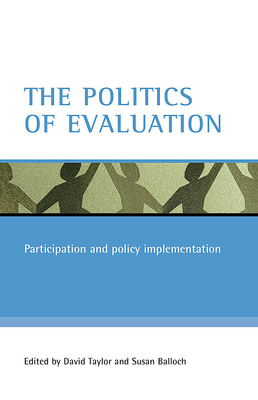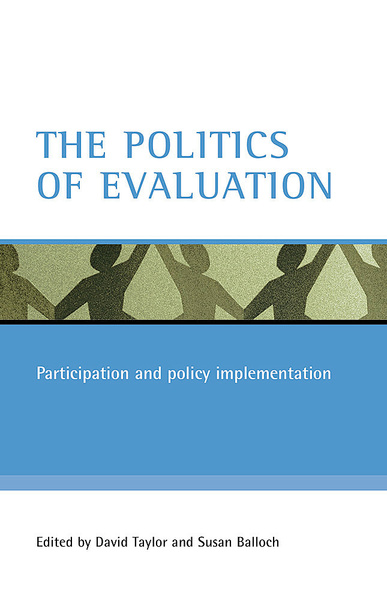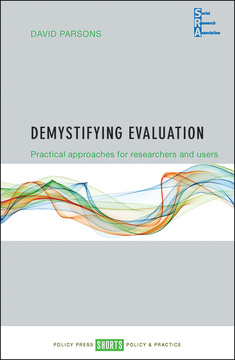The politics of evaluation
Participation and policy implementation
Edited by David Taylor and Susan Balloch
Published
Jan 19, 2005Page count
280 pagesISBN
978-1861346056Dimensions
234 x 156 mmImprint
Policy PressPublished
Jan 19, 2005Page count
280 pagesISBN
978-1861346063Dimensions
234 x 156 mmImprint
Policy PressEvaluation has become a central tool in the development of contemporary social policy. Its widespread popularity is based on the need to provide evidence of the effectiveness of policies and programmes. This book sees evaluation as an inherently political activity, as much about forms of governance as scientific practice. Using a wide range of examples from neighbourhood renewal, health and social care and other aspects of social policy, it relates practical issues in evaluation design to their political contexts.
With contributions from leading academics and evaluation practitioners, the book considers key issues in the politics of evaluation including: governance and evaluation; participatory evaluation; partnerships and evaluation; and learning from evaluation.
The politics of evaluation is important reading for academics, social researchers, policy makers, service providers and professionals across the public services as well as professional evaluators. It will be a valuable resource for students on a range of social science and professional courses and those concerned with recent developments in social research methodology.
"I never thought I would find myself describing a book on evaluation as exciting, but this one is. I recommend it to anyone leading or evaluating projects." The British Journal of Healthcare Computing & Information Management
" ... this collection provides a wide range of interesting cases of evaluations and evaluators trying to deal with the complexities of practice in a very turbulent policy environment." Journal of Social Policy
"This book will provide students (undergraduate and postgraduate) and academic researchers with a useful and interesting entree into the political and practical aspects of policy programme evaluation. The overall appeal of the book lies in the breadth of policy arenas covered, the experiences and insights gleaned from an eclectic mix of real life case studies, its logical structure and clean and clear written style." Policy World
"...a book which sets out to examine the politics of evaluation is very timely. ... For those working in areas related to urban studies, this book covers some important issues of urban policy and regeneration." Urban Studies
"... the contributors to this volume, all of whome have seen hard service in the vast and lucrative army of academic evaluators in Blairite England, tell their battle stoires in this volume ... Useful? Yes." British Journal of Sociology
"This is an exciting book that raises critical questions about politics and power in evaluation research." Janet Newman, Faculty of Social Sciences, The Open University
David Taylor is Head of the School of Applied Social Science at the University of Brighton. He is Editor of the collection Breaking down barriers: Reviewing partnership practice (HSPRC, 2001) and is a member of the Editorial Collective of the journal Critical Social Policy.
Susan Balloch is Professor of Health and Social Care and Director of the Health and Social Policy Research Centre at the University of Brighton. She is co-author of Social services: Working under pressure (1999) and Partnership working: Policy and practice (2001), also published by The Policy Press.
Introduction: The politics of evaluation: an overview ~ David Taylor and Susan Balloch; Part One: Governance and evaluation: Below decks on the youth justice flagship: the politics of evaluation ~ Peter Squires and Lynda Measor; Urban regeneration: who defines the indicators? ~ Peter Ambrose; Reaching for the stars: the performance assessment framework for social services ~ Stella Law and Karin Janzon; Part Two: Participation and evaluation: Service-user involvement in evaluation and research: issues, dilemmas and destinations ~ Peter Beresford; Best Value but not best interests: can service users instruct mental health advocates? ~ Hazel Platzer; New Deal for Communities as a participatory public policy: the challenges for evaluation ~ Kay Graham and Amanda Harris; Discovery through dialogue and appreciative inquiry: a participative evaluation framework for project development ~ Glynis Cousin, Judith Cousin and Frances Deepwell; Evaluating projects aimed at supporting the parents of young people: "I didn't learn anything new, but..." ~ Debi Roker; Part Three: Partnerships and evaluation: Evaluating interagency working in health and social care: politics, policies and outcomes for service users ~ Audrey Leathard; Reflections on an evaluation of partnerships to cope with winter pressures ~ Susan Balloch, Alison Penn and Helen Charnley; Evaluating a partnership approach to supporting people into employment ~ Hilary Arksey; Part Four: Learning from evaluation: Evaluation and New Deal for Communities: learning what for whom? ~ Ian Smith and Lucy Grimshaw; Community-led regeneration: learning loops or reinvented wheels? ~ Mike Rowe and Marilyn Taylor; Can social capital be a framework for participative evaluation of community health work? ~ Jennie Fleming and Thilo Boeck; Learning the art of evaluation: presume the presence of politics ~ Georgie Parry-Crooke and Cathy Sullivan; Conclusion: What the politics of evaluation implies ~ Susan Balloch and David Taylor.










